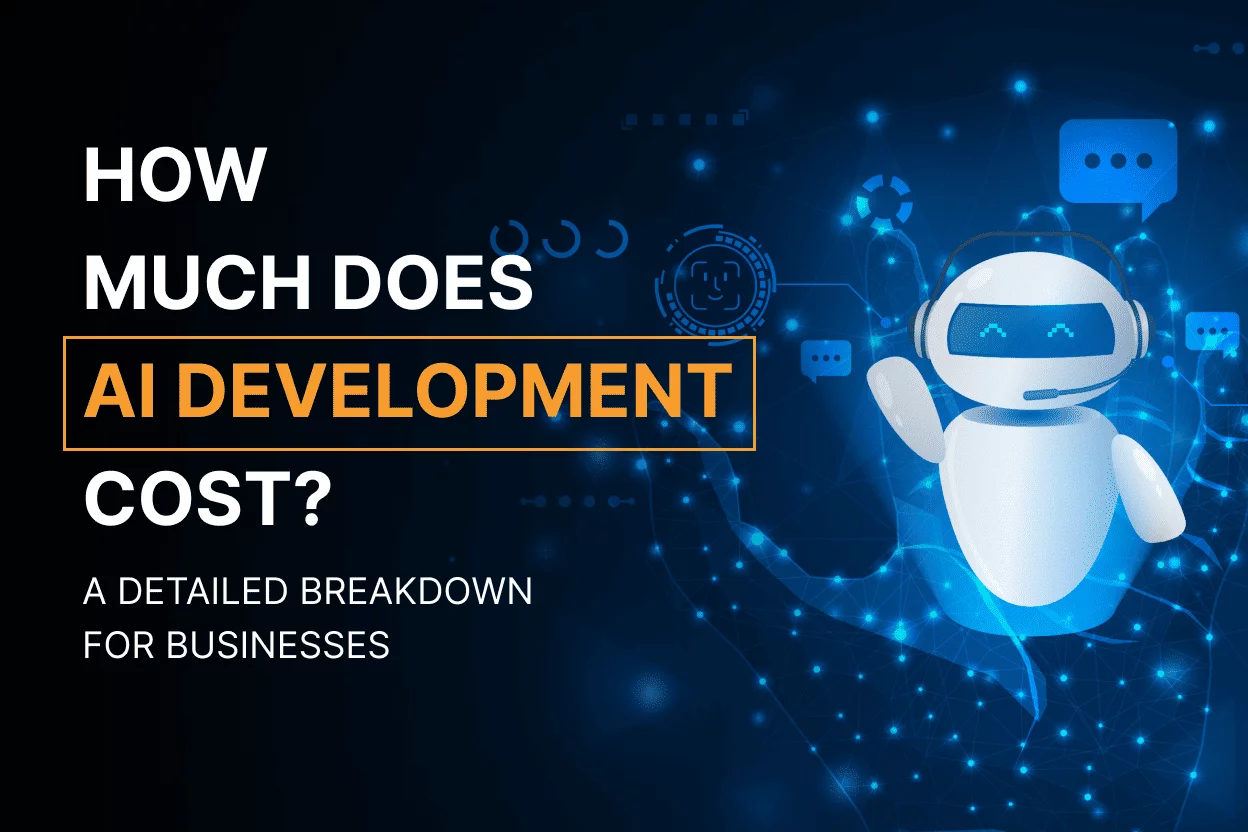Gartner predicts that AI Agents in Customer Service will handle over 80% of standard support tasks by 2029, reducing the need for human intervention. Businesses are adopting them for faster, smarter service.
Understanding their role isn’t just timely; in fact, it’s essential for brands aiming to stay competitive and customer-centric in a digital-first world. Read on to discover how AI agents are redefining customer experience, and how your brand, too, can harness it for competitive advantage.
What Are AI Agents for Customer Service
AI agents for customer service are AI-powered systems that interact with customers, resolve queries, and perform tasks on their own. Driven by natural language processing and machine learning, they understand intent, provide instant responses, and escalate complex issues when needed. Smarter Workflows can be unlocked with AI/ML services for driving efficiency and growth.
“AI agents will become our digital assistants, helping us navigate the complexities of the modern world. They will make our lives easier and more efficient.” — Jeff Bezos
Unlike basic bots, AI agents continuously learn from interactions, enabling faster, more personalized support. They help businesses scale service delivery, reduce costs, and meet rising customer expectations with speed and precision.
Common Customer Service Challenges AI Agents Can Solve

1. Long Wait Times
According to Ringover’s 2024 findings, poor customer experiences risk $846B in U.S. losses and $2.8T globally, with 38% reducing spending and 13% stopping entirely. When customers are left waiting, they feel frustrated. It fades their trust. But with AI agents, support becomes instant – no more waiting, no more friction.
AI agents for customer service eliminate delays by quickly responding to queries, streamlining support workflows, and ensuring faster resolution. This boosts satisfaction, reduces churn, and frees human agents to focus on complex, high-value interactions.
2. Limited Availability
No availability during business hours restricts customer access, contributing to missed opportunities. CallMiner’s findings reveal that 33% of customers expect quick replies, but the average company response is 12 hours and 10 minutes.
AI agents offer a smart solution to this challenge through 24/7 service across time zones. This ensures uninterrupted assistance, faster resolutions, and higher customer satisfaction. Plus, it eliminates the need for round-the-clock human staffing or expensive overtime.
3. High Query Volumes
When support teams are flooded with queries, it leads to a slowing down of response time. To prevent this from happening, AI agents can be employed. These agents are bots that work by managing thousands of interactions simultaneously. They triage, resolve, and escalate issues with speed and precision. This helps maintain consistent service quality, accelerate resolution times, and ease the workload on human customer service teams.
4. Repetitive Inquiries
Unclear guidance and limited support channels trigger frustration among customers. This compels them to keep asking the same questions. AI agents step in to resolve this issue efficiently. These agents deliver consistent, context-aware responses by learning from every interaction.
An October 2024 arXiv study found that real-time FAQ detection delivers answers within 2 seconds, reducing handling time and costs. Thus, AI agents proactively surface relevant information, cutting down on repetition, streamlining support, and elevating customer satisfaction at every touchpoint.
5. Language Barriers
According to WhosOn’s, 86% of contact centers get non-English calls, yet many struggle to support them. With AI-driven chatbots, language barriers fade as they understand multilingual inputs, translate in real time, and adjust tone for cultural relevance. This technology enables seamless communication across regions, bridging linguistic and cultural gaps. As a result, customers get accurate, empathetic support, regardless of language or location.
6. Poor Ticket Routing
Without proper routing, support teams chase the wrong problems, putting customers on hold. However, AI agents flip that script. They solve this by sorting tickets smartly, using context, urgency, and who’s best to handle them. This leads to faster, more accurate assignments and ultimately improves customer satisfaction.
7. Inconsistent Responses
Lack of alignment in messaging confuses customers, impacting trust and brand credibility. With AI-powered agents in place, this challenge no longer slows things down. It handles this by delivering reliable, context-aware answers across channels. The system learns from interactions, applies unified logic. Lastly, it ensures every customer receives accurate, consistent support – no matter when or where they engage.
8. Lack of Insightful Analytics
McKinsey reports that companies using customer analytics are nearly twice as likely to lead in profit, sales, and ROI. Yet many businesses still struggle with insight gaps. They don’t just slow down decisions. They blur the big picture and affect growth signals. This problem becomes manageable with the help of AI-powered agents.
Agents operate simultaneously to gather, interpret, and contextualize data across systems and touchpoints. It delivers real-time, actionable insights tailored to business needs and decision-making contexts. This empowers leaders to make informed choices, optimize outcomes, and stay ahead of change.
How AI Agents in Customer Service Work
Think of AI agents as super listeners. They work autonomously and don’t just catch what you say, but also how you say it and what it means. By leveraging natural language processing, performing intent recognition, and contextual understanding, it crafts replies with helpful answers that feel made just for you.
Plus, for storing and applying context across interactions, agents use persistent memory systems. Besides, they utilize various tools for executing multi-step tasks like automating routine queries and escalating complex issues. AI agents learn from interactions to improve over time, which enhances customer satisfaction while reducing operational costs. Their ability to handle scale and nuance makes them vital to modern service strategies.
For instance, detecting frustration in a customer’s tone, a telecom AI agent bypasses scripted replies. Further, it instantly offers a bill waiver, turning a potential churn into a loyalty win through emotional intelligence and smart automation.
Real-World Use Cases of AI Agents in Customer Service
Case Study #1: Carvana scales smarter customer service using Azure AI agents
A used car retailer company, Carvana, transformed its customer service by leveraging an AI agent, “Sebastian,” which is powered by Azure Kubernetes Service. Sebastian turns customer interaction into actionable insights that enhance support and reduce inbound calls.
Additionally, their CARE platform scales effortlessly, enabling real-time insights and proactive support. It’s a standout example of how AI agents can reshape customer service into a more agile, intuitive, and tailored experience.
Case Study #2: H&M reimagines customer engagement using AI-driven agents
H&M, a Swedish multinational fast-fashion retailer, leverages AI agents to boost customer engagement. The technology helps the company deliver personalized styling advice, real-time inventory updates, and seamless support across channels. The outcome? A 20% boost in conversion rates and sharper demand forecasting. The company redefined retail responsiveness and elevated the shopping experience through blending automation with human-like interaction.
Case Study #3: Octave HI transforms investor onboarding with Intelegain’s agentic AI chatbot
An investment firm, Octave HI, optimized investor onboarding with an AI chatbot built by Intelegain, automating lead qualification, education, and support. The solution handles 85% of interactions and boosts conversions. This helped the company cut call volumes by 30%, with 60% of firms reporting higher satisfaction and faster resolution of routine queries.
Benefits of AI Agents in Customer Service

- 24/7 Availability: AI agents for customer service offer uninterrupted, round-the-clock support across geographies. This autonomous system ensures customers receive timely assistance regardless of time zone or location. It helps eliminate service gaps and boosts customer satisfaction through consistent, timely support. Moreover, without any compromise in the quality, AI agents empower businesses to respond globally in real time.
- Instant Response & Resolution: By delivering real-time answers to routine queries, AI agents minimize wait times and speed up issue resolution. The result? A smoother customer experience, fewer backlogged tickets, and human agents freed up for high-value, complex tasks.
- Cost Optimization: Operational expenses drop as AI agents handle everyday tasks, reduce manual effort, and enhance service efficiency. This allows businesses to scale service delivery efficiently while reallocating resources toward strategic initiatives and high-impact customer interactions.
- Personalized Interactions at Scale: Using customer history and intent recognition, AI agents deliver tailored responses instantly. This enables personalized engagement across thousands of users with speed, relevance, and consistency.
- Scalability Without Headcount: AI-powered support enables scalability without increasing headcount. These smart agents manage rising volumes of customer interactions with personalized, intent-aware responses. The result is cost-efficient growth and consistent service quality across channels.
- Operational Efficiency: With AI agents in place, businesses achieve faster resolutions, fewer manual touchpoints, and more reliable customer support. The system enables 24/7 support, optimizes resource allocation, and enhances workflow accuracy. Ultimately, this leads to faster responses and a more agile customer service ecosystem.
- Actionable Customer Insights: Through continuous interaction tracking, AI agents uncover behavioral trends, service gaps, and individual preferences. These insights empower businesses to refine service strategies, personalize experiences, and drive continuous improvement.
How AI Agents Improve Customer Service While Boosting ROI
From instant answers to hyper-personalized care, AI agents supercharge customer service. They tailor responses and scale support with precision and speed. They reduce operational costs, enhance customer satisfaction, and free up human agents for complex tasks. With round-the-clock support, along with instant insights, AI agents enable businesses to stay sharp and maintain customer loyalty. As a result of this, AI agents directly drive ROI, thus delivering faster resolutions, lower support costs, and stronger customer retention at scale.
Agentic AI vs AI Agents in Customer Service
Although Agentic AI and AI Agents may sound alike, they represent two fundamentally different levels of intelligence and autonomy in customer service systems. Let’s understand this with the help of a comparison table.
| Feature | AI Agents in Customer Service | Agentic AI in Customer Service |
|---|---|---|
| Autonomy | Low – follows instructions | High – sets and pursues goals |
| Adaptability | Limited | Dynamic and self-improving |
| Decision-making | Based on rules/workflows | Contextual and strategic |
| Human dependency | Requires prompts | Operates independently |
| Use Case Complexity | Routine tasks | Complex, evolving scenarios |
If you’re thinking about shaping the future of intelligent automation, here are the Top 20 Agentic AI Project Ideas for 2025, offering a blueprint to start building.
Final Thoughts
AI agents are redefining customer service by delivering instant, intelligent, and personalized support at scale. Through automating routine tasks and learning from every interaction, they boost satisfaction, reduce costs, and free human agents for strategic work. The payoff? A leaner, more adaptive service ecosystem that is engineered for speed, scale, and strategic resilience.
Transform your customer service with Intelegain’s AI agents – smart, scalable, and tailored for impact. Reach out to us today.
FAQs
An AI agent is a smart system that senses, learns, and acts independently to solve problems, complete tasks, and achieve goals using digital tools.
AI improves customer service by automating responses, analyzing sentiment, and personalizing interactions. It offers 24/7 support, thereby boosting efficiency, reducing costs, and enhancing satisfaction across chat, email, and voice channels.
An AI agent delivers instant, personalized support, reduces wait times, handles high volumes, cuts costs, and frees human agents for complex, high-value interactions.
To build an AI agent in customer service, define goals, train NLP models, integrate APIs, design dialogue flows, test responses, and continuously improve using feedback and real customer interaction data.
AI agents will deliver hyper-personalized, predictive support, blending automation with empathy to enhance customer loyalty, reduce churn, and empower human agents with real-time insights and assistance.
To ensure data security in AI-powered customer service, implement encryption, access controls, data anonymization, regular audits, and strict compliance with privacy regulations like GDPR and CCPA.
Let’s Build the Future with AI Agent for Customer Service













